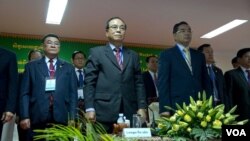The ruling party and opposition on Monday held a workshop to discuss two draft laws on election reform, but many civil society groups refused to attend, claiming parts of the bills fall short and are unconstitutional.
The ruling Cambodian People’s Party and opposition Cambodia National Rescue Party have been negotiating over reform since July, when the Rescue Party ended a nearly yearlong boycott of government, following 2013 elections it said were marred by fraud.
The two drafts, which dictate the formation of election bodies, regulations and other key procedures, are the result of those negotiations. But pro-democracy and rights groups, including the election-monitoring watchdog Comfrel, the rights group Adhoc, and Transparency International, say the laws inhibit free speech.
Still, some 400 people attended the public forum on the drafts—called the Law on the Election of Members of the National Assembly and the Law on the National Election Committee—for a five-hour workshop on Monday.
Rescue Party lawmaker Kuoy Bun Roeun said the drafts will help prevent political stand-offs in the future, through its “independence and accuracy.”
The NEC law aims to establish and independent election body, one with its own budget, that is appointed by four members each of the ruling party and opposition, as well as an independent ninth person. Members of the committee must have Cambodian nationality.
The election law increases the number of seats in the National Assembly from 123 to 125. It prescribes the loss of seats to a political party that boycotts elections or fails to swear in on the first Assembly session following an election.
But it also puts extra mandates on civic groups and NGOs, calling for them to remain “neutral” during election periods. It prohibits them from taking part in elections or campaigns, or from broadcasting commentary on political parties—punishable by a steep fine of up to $5,000.
Speaking at the Monday workshop, EU Ambassador Jean-Francois Cautain expressed his concern over that portion of the law, Article 84. He questioned whether the lawmakers had taken into account concerns from civil society leaders, who say that part of the law is a ban on free speech.
CPP lawmaker Sik bun Hok said the laws comply with international standards and aim to protect people from political attacks. “Everyone has the right to protection under the law, against such interference or attack,” he said. “Therefore, these laws aim for the protection [of people].”
Koul Panha, executive director for Comfrel, told VOA Khmer on Monday that more than 60 NGOs disagree with the reforms, especially prohibitions on speech. They are calling on the parties to drop Article 84 from the election law.
“We demand broader debate on these two draft laws and want to drop some articles that pressure political rights of civil society,” he said. “It is not in compliance of our constitutional law.”








